At Long Last Love
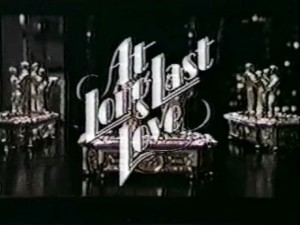 Here’s the idea behind “A Canadian, an American, and an Elitist”: Rhett’s favorite movie is Meatballs 4, Shawn has an unhealthy fixation on Resident Evil, and Adam is a prick who hates everything. We all watch far too many movies, and spend our time analyzing them. So we each watch the same movie, write our analysis of them, and then go to a chat room to discuss it, unaware of what the others have written. A warning: if you haven’t seen the film we are discussing, it may not be best to read this article, because it is spoiler heavy.
Here’s the idea behind “A Canadian, an American, and an Elitist”: Rhett’s favorite movie is Meatballs 4, Shawn has an unhealthy fixation on Resident Evil, and Adam is a prick who hates everything. We all watch far too many movies, and spend our time analyzing them. So we each watch the same movie, write our analysis of them, and then go to a chat room to discuss it, unaware of what the others have written. A warning: if you haven’t seen the film we are discussing, it may not be best to read this article, because it is spoiler heavy.
At Long Last Love was a critical and financial disaster for director Peter Bogdanovich and has therefore never been available on VHS, laserdisc, or DVD. The print I tracked down (when the essays were written and the chat occurred in 2005) was not in great shape, it had been recorded off of television and it was a few generations below pristine. Unfortunately, there has been no news on a release of the film, which probably also has to do with trying to clear the many Cole Porter songs in the movie. So if you want to see the film, I’d suggest alternate means than legitimate channels. It can be found without looking too hard. For a time, it was also available on Netflix-streaming in what was said to be a slightly different version than the one we reviewed.
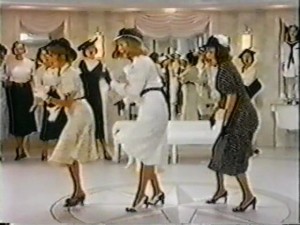 Analysis by a Canadian: Rhett Miller
Analysis by a Canadian: Rhett Miller
If Peter Biskind’s tabloid-like expose of all the dirt and scandal of the American New Wave in “Easy Riders, Raging Bulls” is any indicator, Peter Bogdanovich was the most hated man in the business. Whether or not it was his association and constant name dropping of everyone in old Hollywood, his messy split from industry doll Polly Platt, or his growing ambition to mine from within the new Hollywood a rekindled sense of the old, Bogdanovich didn’t seem to be making a lot of friends. Like the similarly disliked William Friedkin, it seems that colleagues were feeding Bogdanovich’s ego with each box office success while producers lined up bigger money for more ambitious projects in hopes one of them would create the Titanic.
Friedkin tanked with Sorcerer in 1977, but his publicized fall into disfavor was no match for the vicious free-for-all lodged towards Bogdanovich with his trilogy of flops from 1974-1976. Bogdanovich found much success in reviving the screwball comedy and the road picture with What’s Up, Doc? and Paper Moon, but the tides turned when he went for a more serious and somber costume drama with Daisy Miller. Whether it was the subject matter or the revile of seeing Bogdanovich fawn over the woman who split him from Platt. The movie was a flop, but a quiet and respectable one, given the Oscar-friendly subject matter. But At Long Last Love, with its attempt to revive the lower-brow musical, was treated far less respectably. It was an outright disaster, marred by production delays tied to the ambitious musical numbers done in real time. Critics roasted Bogdanovich for his conceit in making a musical, and attacked Shepherd even more for trying to sing in it. The fat lady had sung, and within a few years both Bogdanovich’s career and his relationship would be no longer.
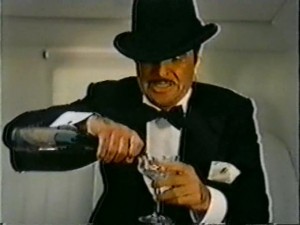 Considering all the critical venom it received when it was released, it is tough now to see what exactly Bogdanovich did wrong with At Long Last Love. The plot, a lighthearted romp with the idle rich and their intertwining relationships, is no more shallow than the typical MGM musical of its time. The cinematography, with its long movements and constantly changing lighting conditions, is no less ambitious and successful than Singin’ in the Rain. The editing, with every cut so perfectly timed it seems as if the film is one total unabridged take (although many scenes do run ambitiously longer than most films), is impeccable. The music, composed entirely of Cole Porter classics, certainly cannot be faulted. Apparently Cybill can’t hold a note, but from the muddled transfer I saw, she held up just fine. Madeline Kahn, Burt Reynolds and the rest of Bogdanovich’s picture show team do an amiable job of bringing Porter’s music to life and keeping the film at a bubbly and brisk pace. The entire film comes off pitch perfect as an old school musical, and to criticize it for its production values would be criticizing the entire genre as a whole. Nobody criticizes a romantic comedy for letting the two lovers unite at the end, so why should Bogdanovich’s film be chastised for recreating the conventions of the musical?
Considering all the critical venom it received when it was released, it is tough now to see what exactly Bogdanovich did wrong with At Long Last Love. The plot, a lighthearted romp with the idle rich and their intertwining relationships, is no more shallow than the typical MGM musical of its time. The cinematography, with its long movements and constantly changing lighting conditions, is no less ambitious and successful than Singin’ in the Rain. The editing, with every cut so perfectly timed it seems as if the film is one total unabridged take (although many scenes do run ambitiously longer than most films), is impeccable. The music, composed entirely of Cole Porter classics, certainly cannot be faulted. Apparently Cybill can’t hold a note, but from the muddled transfer I saw, she held up just fine. Madeline Kahn, Burt Reynolds and the rest of Bogdanovich’s picture show team do an amiable job of bringing Porter’s music to life and keeping the film at a bubbly and brisk pace. The entire film comes off pitch perfect as an old school musical, and to criticize it for its production values would be criticizing the entire genre as a whole. Nobody criticizes a romantic comedy for letting the two lovers unite at the end, so why should Bogdanovich’s film be chastised for recreating the conventions of the musical?
Indeed, it seems that the film is a failure only in that the media sought to dethrone Bogdanovich and Shepherd from their lover’s mantle like they would do later with Ben Affleck and Jennifer Lopez with Gigli. Their love affair had lasted too long, their egos had apparently gotten too big, and like a pack of wolves, tinseltown had a feast on the remains of their careers. The unfair and unjust condemnation of Peter Bogdanovich in the industry is one of the true tragedies left behind in the American New Wave. Here was a director with ambition, energy and a purpose. Bogdanovich was to bring about an affectionate and progressive return to the older forms of narrative cinema, reviving each failed genre with a new energy and with the hindsight offered by the freedom the seventies offered. He didn’t merely recreate genres, he instead emulated their look and feel in order to say new things with the same old package. Todd Haynes would be praised years later for doing similar with Far From Heaven, but Bogdanovich was cut down right when he was starting to reach his stride.
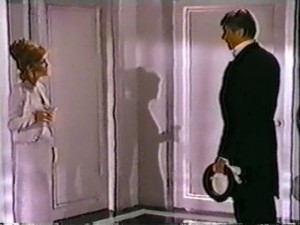 To say At Long Last Love achieves at being an old style musical would be a disservice to the things Bogdanovich has done with the film. He’s done more than just recreate the genre’s elegance and technical beauty, although those traits are not to be ignored. He peppers throughout the film a new sort of self-reflexivity, where the characters themselves acknowledge the absurdity of the whole song and dance numbers. “Are you singing to me sir?” the butler asks Reynolds. “No. I was singing to myself,” Reynolds says with a slight embarrassment on his face. There is a hint that the characters themselves understand they are in a musical, as if they’ve already been to Woody Allen’s The Purple Rose of Cairo and seen through the movie screen. They sing and dance because they have inherited the whimsy of love, but they also do so out of duty of saving face in a genre long past its prime.
To say At Long Last Love achieves at being an old style musical would be a disservice to the things Bogdanovich has done with the film. He’s done more than just recreate the genre’s elegance and technical beauty, although those traits are not to be ignored. He peppers throughout the film a new sort of self-reflexivity, where the characters themselves acknowledge the absurdity of the whole song and dance numbers. “Are you singing to me sir?” the butler asks Reynolds. “No. I was singing to myself,” Reynolds says with a slight embarrassment on his face. There is a hint that the characters themselves understand they are in a musical, as if they’ve already been to Woody Allen’s The Purple Rose of Cairo and seen through the movie screen. They sing and dance because they have inherited the whimsy of love, but they also do so out of duty of saving face in a genre long past its prime.
Why then, would these characters partake in all the singing if they know its absurdity? They realize that they are there to entertain, to give the audiences a sense of lavish escape into the fun and glamour of the rich and happy. The musical is a genre that flourished in the thirties, and one that no doubt maintained its popularity because of its ability to divert people’s attention away from the perils of the Great Depression. Similarly, At Long Last Love is Bogdanovich’s attempt to move away at all the angst and rebellion so chic in the sixties and seventies, and attempt to just give audiences something to be happy about. With Easy Rider, Joe, Zabriskie Point, The Rain People and even Bogdanovich’s own The Last Picture Show, America had been inundated with hopeless affirmation. The seventies were a time of great turmoil, its only comparison being the change brought about by the G.D. Shepherd’s character refers to “The Crash” in the film, and how the characters capably forget that time and move on with more exciting pursuits. So Bogdanovich offers with At Long Last Love a new hope for simply appreciating the zest of life, the crazy fun involved in love. He would perfect the breezy chase and chat picture with They All Laughed, but after the scorn Bogdanovich faced with At Long Last Love, he no longer had the audience to convey his message.
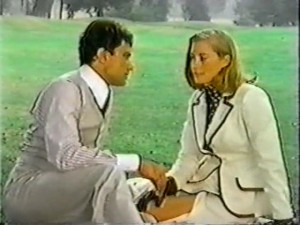 Another thing overlooked about Love is its progressive stance towards women. Women’s lib was at full stride in 1975 and Bogdanovich takes this changed stance and transplants it into the conservative standards of the musical. The woman was a mere conquest in musicals of yore, always one to tease the male lead with advances until finally accepting his hand at the finale. At Long Last Love does not offer such a simple and sexist resolve, as it develops in its final act a surprisingly electric relationship between the two female conquests. After being fed up with all the vague advances and promises offered up by their male pursuers, Shepherd and Kahn finally just meet up and talk about how absurd the whole thing is. These men care more about their images and their trophies than they do their love, and why should women settle for that? It isn’t until the final dance that the two women realize that it matters not which woman each man will choose. What matters is who the women will choose, and they ultimately choose each other. In the final shot of the film they realize their place together, as their music box representations part from the men and end in a final embrace together. In having this unfold in the metaphor of a music box, Bogdanovich keeps his feminist message subtle and without aggression. It’s a nice and breezy musical, but with ideas to change the dated notions we now hold as conventions.
Another thing overlooked about Love is its progressive stance towards women. Women’s lib was at full stride in 1975 and Bogdanovich takes this changed stance and transplants it into the conservative standards of the musical. The woman was a mere conquest in musicals of yore, always one to tease the male lead with advances until finally accepting his hand at the finale. At Long Last Love does not offer such a simple and sexist resolve, as it develops in its final act a surprisingly electric relationship between the two female conquests. After being fed up with all the vague advances and promises offered up by their male pursuers, Shepherd and Kahn finally just meet up and talk about how absurd the whole thing is. These men care more about their images and their trophies than they do their love, and why should women settle for that? It isn’t until the final dance that the two women realize that it matters not which woman each man will choose. What matters is who the women will choose, and they ultimately choose each other. In the final shot of the film they realize their place together, as their music box representations part from the men and end in a final embrace together. In having this unfold in the metaphor of a music box, Bogdanovich keeps his feminist message subtle and without aggression. It’s a nice and breezy musical, but with ideas to change the dated notions we now hold as conventions.
It is easy simply to attack Shepherd for her performance in the film, but doing so would be overlooking all the great things Bogdanovich attempts and achieves with At Long Last Love. Shepherd has never been a good actress, not in The Heartbreak Kid nor in Taxi Driver, yet because of some jealous hate complex towards Bogdanovich, her presence alone was worthy of a thousand pans. Her performance is only one key on Bogdanovich’s musical crescendo, a weakness in an otherwise masterful piece. At Long Last Love is a movie that goes down with the sweetness of a thirties musical, but one that nourishes with the ideas of an important seventies drama. Bogdanovich’s career was never the same after it, and we have the vicious nature of media and industry to blame for it. He was a man who sung great covers, and one who had his microphone unplugged in mid-chorus.
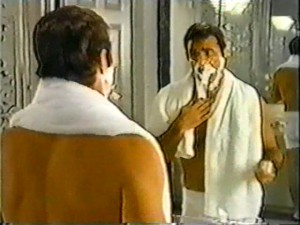 Analysis by an American: Shawn McLoughlin
Analysis by an American: Shawn McLoughlin
This is an open apology to loyal readers of A Regrettable Moment of Sincerity. Peter Bogdanovich’s At Long Last Love runs at just a reasonable hour and thirty-eight minutes. At that length I can handle the worst of the worst. I loved Kansas City Bomber, giggle like a girl through Battlefield Earth, and can watch House of the Dead for the nth time. It goes without saying that I am seriously looking forward to the DVD release of Howling II: Your Sister is a Werewolf (In stores as you read this, get yours today). I am writing this review starting at the 1:09 minute marker, not because I am rushing this review, but because I am trying to distract myself from listening to Cybill Shepherd and Burt Reynolds desecrate Cole Porter’s “It’s De-lovely.” It has taken me three hours to make it this far.
So what the hell might have happened? What can make a movie so bad that even Shawn, who will watch anything, hate it so much? This is a difficult question to answer. I loved the nod during the opening credits to Busby Berkeley. The mirrors surround the music box so they form an infinity, or multiplicity, image of sorts. At least, that’s what I would like to think Bogdanovich is going for. Burt and Cybill’s Astaire and Rogers is about as unconvincing as possible. I realize comparison is futile, but if the director was trying to make a new musical in the style of the 30s films, why is he using sets that more than echo those in Swing Time? The projected backgrounds in the driving scenes and the stock footage at the racing track. Those are quite fun, and hark back to the era of filmmaking where simplistic effects were dismissed because they were not the point of the film. But in 1975, the same 1975 that gave the world Jaws, Dog Day Afternoon, and the much more unique musical The Rocky Horror Picture Show, one has to wonder who thought this was a good idea. Was the idea a backlash against the gritty realism of the decade’s films? I could buy that; it certainly is light fare. The most bizarre, and unanswerable question is why would you cast a musical with people who can’t sing. The always fantastic Madeline Kahn is still playing Lili von Shtupp. Cybill couldn’t carry a note to save her life, and Burt… isn’t even worth discussion. It isn’t played for laughs, and is too stuck in homage to the source era to be considered a satire. As a result, 90% of the movie fails.
What does work, and what is presented best of all is the theme. As the film ends and we are pulled out of the music box world. The music and dancing figurines stop and as the credits roll we hear car horns and street bustle. I would like to think, that this is the real point of the film. You can have the nostalgia of simpler times, but realize that you can’t go back. The real world is always where you are forced to return. In that regard, perhaps the casting of stars that could in no way match the presence of the golden era wasn’t so off-target. The movie is a dream, a “what if” story. What if the stars of today were dropped in the studios of yesteryear? Sadly, this film proves that the thought works better in the mind than the screen. That haunting ending is, in a way, more heartbreaking than even the grittiest the decade offered us. It’s an incredible finale and fine redemption for a film you would never expect to see it attached to.
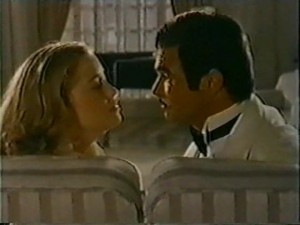 Analysis by an elitist: Adam Lippe
Analysis by an elitist: Adam Lippe
“I’m tired of being a masochist.”
Merging the awful with the astounding is a balancing act that is rarely pulled off. In horror and sci-fi films, when a certain level of campiness can be accepted, a filmmaker can get away with it. Such is a movie like John Carpenter’s They Live, in which a creepy satire of American culture and its obsession with material possessions is interrupted fairly frequently for star Roddy Piper to deliver silly one-liners and show off his wrestling skills. It’s never a distraction for the audience because it seems somehow appropriate for such a goofy film, that the constant tone changes become the tone. However, in a musical, such as with Peter Bogdanovich’s At Long Last Love, which opens with Madeline Kahn drunkenly crooning totally off-key, it’s a mistake that the film never recovers from.
The problem is the viewer cringes right away at Kahn’s efforts, unaware of her talents. So, from then on, one doesn’t wait for Kahn to impress, but simply waits for her to lose her way again, wincing whenever she opens her mouth, in case she loses it. To establish it the other way around would have been a better idea, since then it becomes character development, when she drinks, she can’t sing, as opposed to how it appears now, incompetence. This even hampers the funniest scene in the film, when Kahn is onstage singing amongst the caveman, and we’re not sure whether the fact that it is terrible is on purpose, or inept staging unaware of its own ridiculousness. The joke is something Bogdanovich never manages to get away with, because while Kahn shows she can improve later on in the film (in most of her solo numbers in the final third), being intentionally bad is only slightly worse than what his cast manages when they’re actually trying.
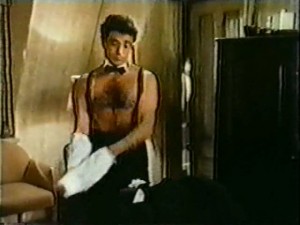 Cybill Shepherd specifically causes convulsions, and not because of her Bogdanovich glasses that she wears (a staple of the men he always cast against the female lead, supposedly because he didn’t want to appear less attractive by comparison), but because of her atrocious atonal voice. Through sheer force, she ruins everyone else’s scenes just by appearing in them, because one fears she might open her mouth. It is the very fact that she is trying so hard and butchering Cole Porter’s tunes that makes Burt Reynolds who easily could have aped Clint Eastwood’s style in Paint Your Wagon by singing like a moose, looks merely laid back in his typical evasive style. In particular, Shepherd does a duet with Kahn as they walk in the park that is nearly impossible to sit through, because as they bat the lyrics back and forth, Shepherd’s missteps are accentuated as it sounds like she is grinding the words.
Cybill Shepherd specifically causes convulsions, and not because of her Bogdanovich glasses that she wears (a staple of the men he always cast against the female lead, supposedly because he didn’t want to appear less attractive by comparison), but because of her atrocious atonal voice. Through sheer force, she ruins everyone else’s scenes just by appearing in them, because one fears she might open her mouth. It is the very fact that she is trying so hard and butchering Cole Porter’s tunes that makes Burt Reynolds who easily could have aped Clint Eastwood’s style in Paint Your Wagon by singing like a moose, looks merely laid back in his typical evasive style. In particular, Shepherd does a duet with Kahn as they walk in the park that is nearly impossible to sit through, because as they bat the lyrics back and forth, Shepherd’s missteps are accentuated as it sounds like she is grinding the words.
The terrible singing would be only a slight distraction if there were more to the film, but, sadly, there isn’t. If the lyrics speak for their feelings and we don’t want to hear what they have to say, we can’t relate, and only appreciate the melodies, which isn’t enough to carry an entire movie. If there were alternate bits of character development, other than the flimsy screwball comedy dialogue that Bogdanovich tries to sneak by as charming, it might have worked. But, as it stands, by allowing the songs to tell the story as opposed to be in aid of it, unless the singing works, we can’t care less about the characters, no matter who is playing them and how often they switch lovers. Even the ending, atypical of a musical, but fitting with a film from the 1970s, only elicits a shrug, because while the characters have schemed to end up with those they desire, which only reveals their general unhappiness overall, they haven’t earned our sympathy or compassion. It is only in the small moments of spontaneity that the film comes to life, such as Burt Reynolds jumping out to ride on the side of his moving car and Dulio Del Prete’s stripping down like a Chippendale dancer, amidst verse, to reveal an amusingly hairy chest. But as they say, when all you have to recommend in your musical is a hairy chest, you’re in trouble.
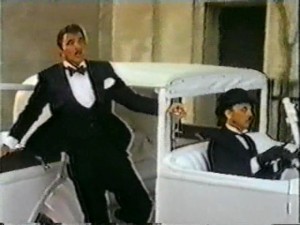 The Chat:
The Chat:
Rhett I know that Cybill Shepherd was supposed to be a knockout, but I never really found her that attractive. Like I wouldn’t kick her out of bed. But it was just kind of textbook cover girl glamour, nothing that made her face resonate. My opinion is probably clouded at how vapid a personality she is on the screen and in real life. She was the Paris Hilton of her day.
Shawn Superficial Americans like me love that. It helped carry me through the movie.
Adam Doesn’t Peter rely on her good looks to carry her scenes though? Obviously, she can’t sing, so since there isn’t much acting to do in the film, the beauty is it for her.
Rhett I didn’t find any problem in her singing abilities.
Adam Really? She was slightly off-key the entire time.
Rhett Everyone cites it as obvious, but I’ve heard much worse on today’s Billboard charts.
Shawn Yes, but the billboard songs you are hearing aren’t Cole Porter tunes.
Rhett Well, I imagine she would have sounded much fuller had the soundtrack been done in a recording booth with lengthy editing and post production. But seeing as everything was recorded on-set, I thought it quite nice. And it sounded more realistic and less like some empty studio fabrication.
Shawn That I will agree with. I thought that the acoustics in the dance hall scenes were fantastic.
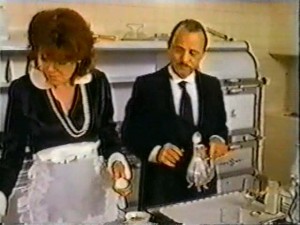 Adam I saw parts of My Fair Lady last week and I will say that every lack of sync was distracting there. In At Long Last Love‘s case, I was drawn in that the lips matched. But, the singing was professional in My Fair Lady and I kept cringing during At Long Last Love.
Adam I saw parts of My Fair Lady last week and I will say that every lack of sync was distracting there. In At Long Last Love‘s case, I was drawn in that the lips matched. But, the singing was professional in My Fair Lady and I kept cringing during At Long Last Love.
Shawn I would have liked to hear the score of ALLL remastered.
Rhett I thought there was some very catchy numbers.
Adam Would the movie have worked if there had been more character and less singing?
Shawn Yes. Or it would have worked more anyway.
Adam Rather, had them intertwine, supporting each other.
Rhett Sure, none have the voice of Cole Porter or anything, but Bogdanovich never had them singing Mariah Carey-esque octaves.
Shawn Even the barest of 30s musicals had a meatier plot.
Adam But the mistake of having Kahn’s first number is intentionally off, that works against the rest of the film
Rhett Why?
Adam Because while she improves, you almost wait for her to screech again. I think you should show her off right away. Then we believe she can sing, as opposed to accepting this will be the norm for the film. Establish her talents early, so we can understand and want to hear her
Shawn And with her prior musical number being from Blazing Saddles, I was put off by it. Like they were just copying that silliness.
Rhett The singing just wasn’t a big issue for me.
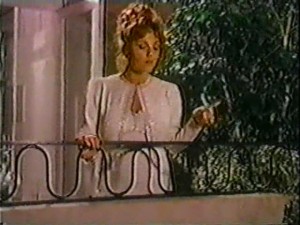 Adam But it was all singing.
Adam But it was all singing.
Rhett There was nothing that I found distractingly bad at all.
Adam So how did you feel about the singing? Not annoying? Is “not annoying” enough for a movie?
Rhett To imply that it is all singing is to ignore the marvelous cinematography throughout. The singing wasn’t great, but the songs sure were.
Shawn Marvelous? I mean… it was good. But nothing that wasn’t done 40 years prior.
Adam Other than the scene with the car crash in the beginning, nothing stuck out for me. The fact that he showed Reynolds wasn’t attached to anything when he was hanging from the car, that impressed me.
Rhett What about the opening 7 minute shot? The average shot length runs over a minute at least and every shot is ambitious in movement and timing… And lighting and reflections, such as the shot with the multiple mirrors.
Adam But Rhett, just like when an element of a production is too noticeable for being too good, like a shot that is too pretty. When the singing is off, no matter how amazing the photography is, it is distracting… Well I assumed that the lack of cutting was to allow the actors to get through as much of the verses as they could.
Rhett Shepherd’s character continually crashing into a mad Kahn as she walks towards her. Until they finally meet in confrontation. Amazing timing and design. The opening scene doesn’t have singing until about 4 minutes 30 seconds in.
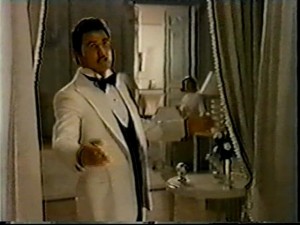 Shawn It’s difficult to cut scenes during songs that are being recorded on stage. Assembling that back together would have been a bitch.
Shawn It’s difficult to cut scenes during songs that are being recorded on stage. Assembling that back together would have been a bitch.
Rhett Even if he needed to rely on long takes for the synching, they are still no less impressive for the camera work.
Adam The credits run until 2:30. So that’s a 2 minute shot.
Rhett There is no cut. It pans around the room.
Shawn And it predates the musical Buffy episode by 27 years. Oddly, the story is almost the same.
Adam Right, so the camera pans around the room. Other than as proof that the crew knew how to lay track, why is this impressive? And there’s a hidden cut in there. You can see it right when the camera stops on the door. There’s a nearly imperceptible shift, but it’s there.
Rhett I don’t know if we can judge that from this master, since there are noticeable jumps throughout, very distracting at times and not something that would have been displayed theatrically.
Adam It’s right before the door opens. You can see it, it’s not a jump.
Shawn What is the time code Adam?
Adam Go to 3 minutes, 14 seconds. See the cut set itself up. Back it up a bit if you have to.
Shawn Yeah, Adam is correct. The dialog that follows is horrible too. Not that that has anything to do with the cut. But it should be noted.
Rhett I don’t really notice it, but for the sake of argument, I’ll give you the benefit of the doubt.
Adam “I gotta write that down some place.” I like that in that opening, the guy has a British accent, but Kahn’s impression is of someone from Boston.
Rhett Still, the hidden edits in the opening of Snake Eyes or Halloween still don’t really take away from the mastery of the scene
Adam Right, but those films give you loads of information and Snake Eyes is insane for what it accomplishes even if it’s 3 shots. Granted the movie falls apart as soon as the shot ends, but just having a long shot isn’t impressive in and of itself. I think The Player makes that point quite well.
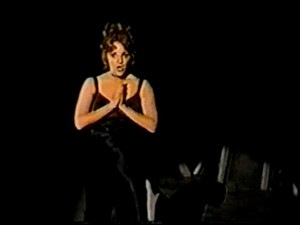 Rhett I thought At Long Last Love was nice and breezy, and had the pacing of a fun glamorous romp. It was slight, but so are most musicals that he was trying to recreate.
Rhett I thought At Long Last Love was nice and breezy, and had the pacing of a fun glamorous romp. It was slight, but so are most musicals that he was trying to recreate.
Adam That should have been on the cover of the never released VHS: “Nice and breezy” – Rhett Miller
Rhett Starring: Cybill Shepherd.
Shawn I think it should be remade as an Internet romance. @ Long Last Love!
Rhett Bogdanovich has a knack for fast-paced character exchanges and lighthearted screwball stories. They All Laughed is a great example of that, and At Long Last Love is similar.
Adam It doesn’t have to be consequential; it just has to be funny. It’s much like listening to Def Poetry Jam. They fool themselves into thinking that speed = talent. A lousy rhyme is just as bad if you speed it up.
Shawn At Long Last Love will remain almost completely unmemorable except for the fantastic ending.
Adam I can see how the ending is an interesting shift. Why do you see it working, Shawn? Did you care about the characters?
Shawn Because I think that says something about Bogdanovich specifically.
Rhett There are some great comedic bits in At Long Last Love, it’s just one lousy rhyme.
Shawn No, but it made me care for Bogdanovich, because this movie was obviously personal.
Adam Is that a Polly Platt joke?
Rhett It is a sad irony that the line in the film “Picture love in Hollywood without divorce” came true for Bogdanovich as a result of this movie… The interplay between the four at the theater with the seat changing, and then with Reynolds and Shepherd at the ball game were both enjoyable.
Shawn The movie is more than a musical, it was his desires. He’s not just nostalgic for the films, he wishes to relive them. And the end echoes perfectly that it is impossible. As did the ticket sales.
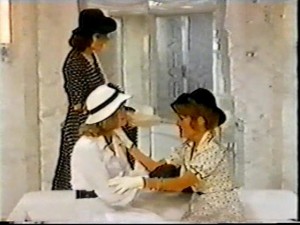 Adam Bogdanovich never came up with anything original ever, he just cleverly imitated styles. He beat the Coen brothers to the punch.
Adam Bogdanovich never came up with anything original ever, he just cleverly imitated styles. He beat the Coen brothers to the punch.
Rhett I viewed the ending more as a feminist slant to the more conservative portrayals of love in thirties film.
Shawn I viewed the ending more as a stance against the films of the times. There was NOTHING this “light and breezy” in 1975.
Adam Oh, I saw it as the only 70s touch.
Rhett It isn’t ultimately about which girl the guy chooses, but instead what the girl wants, and she doesn’t want a guy at all.
Adam A downbeat ending.
Rhett It is too much a metaphor to be downbeat.
Adam A metaphor for what?
Rhett The characters are never developed much, so they are little more than the statues dancing at the start and end.
Shawn Yes, but that fits, because how many Astaire/Rogers characters can people name? It’s not the characters, it is the spectacle. The ending was the films only real redemption to me. It was unexpected and very welcome.
Rhett Had the end been played out with the actual actors it would have been the norm in the seventies. But this took a more detached and symbolic stance, so not to wallow in all the angst of similar New Wave films of the time.
Adam I have a hard time connecting to an ending if I don’t care about anything that preceded it, because I have to invest in the characters, so I felt nothing at the conclusion
Rhett It was just the cherry on another fine Bogdanovich film for me. His films always have the appearance of being mere repetition, but they always end up with some sort of new spin on the whole genre.
Adam I don’t have a problem with the way he goes about it, otherwise I’d have the same issue with the Coens.
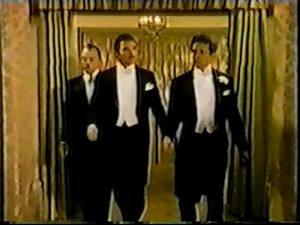 Shawn Nice “You can’t go back again” metaphor. It is amplified by the street noise.
Shawn Nice “You can’t go back again” metaphor. It is amplified by the street noise.
Rhett Are you really looking for complex character development in a musical?
Adam No, I’m not, but I’d prefer to actually know something about them, they felt like pawns, dragged around from scene to scene.
Rhett Dragged around just like the music boxes at the start and the end would suggest?
Shawn What Coen film is being referenced here? Because I can’t connect it.
Adam No, it’s that the Coens often just copy old styles, much like Bogdanovich does.
Rhett That’s like saying that is all Todd Haynes did with Far From Heaven.
Adam Rhett, are you suggesting that the movie is actually totally bleak and depressing and not light and fluffy, thereby negating everything but the ending? Honestly, that’s what I felt with Far From Heaven. I appreciated the effort, but I had already seen All That Heaven Allows.
Shawn I don’t look at the actual music box as resembling characters being dragged about. I look at it as a piece of nostalgia, a relic from a different era.
Rhett What is depressing about the ending? There is nothing in the movie depressing to me in the least bit. The women decline the men and instead hook up themselves. Pretty progressive if you ask me. Their duty is to go through the motions and entertain. This is designed to be escapist in the same way a musical was after the great depression.
Adam I am combining what you say about the film with Shawn’s interpretation: That the ending defines the film, and if the characters are powerless, controlled by the music box, nothing they do matters.
Shawn Which is much more bleak than my interpretation.
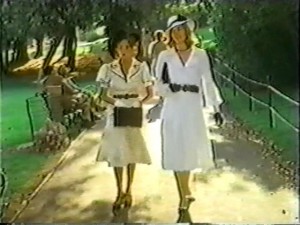 Rhett The characters realize they are in a musical. There is ample reference to the absurdity of busting into song and dance throughout the film. But yet they persist as if Bogdanovich is trying to tell all the Rafelsons, Antonionis and Coppolas to lighten up.
Rhett The characters realize they are in a musical. There is ample reference to the absurdity of busting into song and dance throughout the film. But yet they persist as if Bogdanovich is trying to tell all the Rafelsons, Antonionis and Coppolas to lighten up.
Adam I saw their self-awareness as a way to break the belief that musicals were over.
Rhett It still offers some progressive feminist rhetoric, but doesn’t force it down like some downbeat seventies drama that was becoming overplayed at that point.
Shawn I don’t think this movie makes an outward statement at all. I feel it is all interpersonal. And, I think that wasn’t obvious enough because no reviews I have found pick up on anything remotely nearing that.
Adam So if someone were to say “I can’t buy that a person would just break out into song” there is an out, because there is a level of reality.
Rhett It seemed that reviewers were only intent on breaking up Bogdanovich and Shepherd, just like they did with Bennifer, seeing the people behind the movie more than the merits of the film itself.
Adam Why would Peter apologize if he felt the movie held up?
Rhett Why would Elia Kazan rat out his friends? He was a mouse fighting an elephant; the only way was to surrender.
Adam Yes, but if we are to believe IMDB, the movie cost $6 million and made $1.5 million, not the largest failure. No one apologizes for XXX: State of the Union and that got ripped apart and lost a huge amount of money.
Rhett Yeah, but the movie was chewed out at the box office, when Bogdanovich was the critic’s darling.
Shawn And XXX: 2 gets two DVD releases with commentaries and deleted scenes.
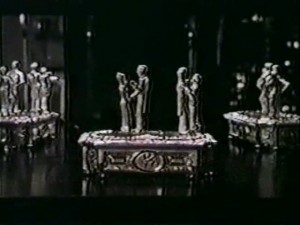 Adam I haven’t seen Lee Tamahori anywhere saying he wishes he could go back to Once Were Warriors, and what a mess he made.
Adam I haven’t seen Lee Tamahori anywhere saying he wishes he could go back to Once Were Warriors, and what a mess he made.
Rhett Yeah, but Lee Tamahori never directed The Last Picture Show, Targets, What’s Up Doc and Paper Moon before XXX: 2.
Adam But Daisy Miller tanked too.
Rhett But that is something to be expected.
Adam It is?
Rhett A period piece based on Henry James.
Adam It was also brutally reviewed, specifically Cybill.
Rhett Daisy Miller is one of those Oscar type movies that does poor box office but is at the very least respected. At Long Last Love had way more on the line since it aimed at much lower-brow subject matter, but still treated with lavish production values.
Shawn Low-brow? I disagree. That may be what it hit, but it certainly isn’t what it aimed for.
Adam Screwball musical is lower brow. But no more so than What’s Up Doc?, which is just as inconsequential.
Rhett It’s lower.
Shawn More lowbrow than say… The Rocky Horror Picture Show?, released the same year?
Adam A movie which bombed, and was poorly reviewed, that didn’t have stars in it though. Or a budget.
Shawn I think Rocky Horror aimed significantly lower though.
Rhett Yeah, but There’s Something About Mary is still lowbrow even compared to John Waters. What’s Up Doc? was low brow too, but not nearly as lavish.
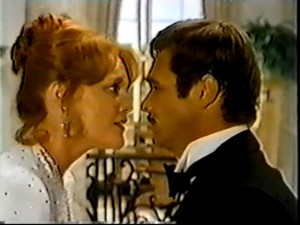 Adam Some of the chase scenes are pretty elaborate, especially the hotel sets.
Adam Some of the chase scenes are pretty elaborate, especially the hotel sets.
Rhett Yeah, but it is something that could pass itself off as a modern comedy. Whereas At Long Last Love makes a point of all its lavish sets, extravagant costumes and real-time music.
Adam It plays a lot like something like Nothing Sacred though: a screwball satire from the 30s with rapid fire dialogue… Rhett, since you obviously enjoyed ALLL, do you think the live singing helps or hurts it? And not just from a technical standpoint.
Rhett I said it before, I think it added a new authenticity to the proceedings, made it seem more real and less stagey. I liked that I was seeing the actual character in the midst of performance. Not just mere lip sync.
Adam It limits it though, because it means they have to shoot on stage and you’re aware of the surrounding the whole time, but it feels like a set.
Rhett There is a musical number in a pool, it isn’t restricting. Like any body of water feels like a constructed set, I guess.
Adam Imagine if they could run around in the park, with Cybill and Kahn’s duet, as opposed to just walking in a straight line. The constraint of having them do it live was that the sound had to be perfect.
Rhett It would be one thing if the camera was static. But Laszlo Kovacs was always moving the camera, there was some beautifully staged stuff. Like the scene where Reynolds keeps turning on lights and Shepherd keeps turning them off. Like the stuff on screen seemed more ambitious than a musical synced afterward.
Adam Yes, but imagine if Lazlo could move the camera around the park and not just on the beaten path. Opening it up might have helped as well. To get at some of the joy in say, The Sound of Music, the dancing and openness.
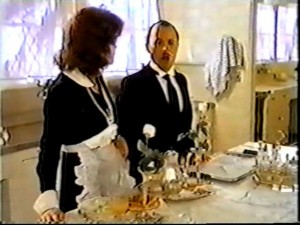 Rhett Liza Minnelli’s real-time number in New York, New York is similar in its impact. I thought that vocal was the best part of the film. I wouldn’t really call the staging of At Long Last Love on the beaten path.
Rhett Liza Minnelli’s real-time number in New York, New York is similar in its impact. I thought that vocal was the best part of the film. I wouldn’t really call the staging of At Long Last Love on the beaten path.
Adam I was referring specifically to the path they walk along.
Rhett The final ballroom dance may happen in a closed area, but the movement is no less inspired. Especially when the couples go in and out of the frame with overlapping dialogue that would make Altman proud. If the visuals were not interesting, perhaps a park frolic would have been nice, but I never once yearned for a more visual space to the film.
Shawn But let’s ask the real question… Why Burt Reynolds?
Adam Because Clint already sang in Paint Your Wagon. Just moving down the list of “least likely to appear in a musical.”
Rhett Where was Klaus Kinski at the time?
Adam Hey, Rhett, you and I both know that Kinski has a beautiful voice. When he’s yelling at German reporters.
Rhett You are right, Adam, I forgot how strongly he could hold the F-bomb with perfect pitch and timbre… I will admit that Cybill Shepherd is a terrible actress. She seems so phony on the screen. Although she is much worse in Daisy Miller.
Adam It is odd that she is just right for Taxi Driver, even funny.
Shawn Yes, but she was THE BOMB in Moonlighting
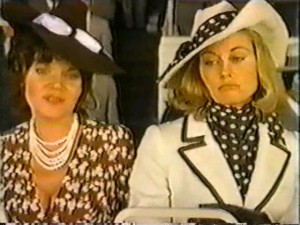 Rhett Yeah, but she even sucks in Taxi Driver. Scorsese just knew how to use her right. Bogdanovich was too busy fawning over her. Dorothy Stratten is directed with a similar ineptitude in They All Laughed where all the other characters are interesting and she just sits around looking pretty, but lost at the same time. I did like how Bogdanovich got Cybill to wear his trademark black rims in At Long Last Love though. I was waiting for Reynolds to bust out those ugly glasses throughout, so seeing her do it was a pleasant surprise. I guess fitting in the way he makes the film ultimately about female empowerment.
Rhett Yeah, but she even sucks in Taxi Driver. Scorsese just knew how to use her right. Bogdanovich was too busy fawning over her. Dorothy Stratten is directed with a similar ineptitude in They All Laughed where all the other characters are interesting and she just sits around looking pretty, but lost at the same time. I did like how Bogdanovich got Cybill to wear his trademark black rims in At Long Last Love though. I was waiting for Reynolds to bust out those ugly glasses throughout, so seeing her do it was a pleasant surprise. I guess fitting in the way he makes the film ultimately about female empowerment.
Shawn Rhett, that’s the reason why I would never be able to be a successful director. Because I will be overwhelmed with desire to sleep with my actresses.
Adam Shawn, that is the reason he always put the Bogdanospecs on the lead actors, so he would appear more attractive. As opposed to a creepy dork.
Shawn I will have to remember that.




Netflix Streaming Theatre Vol. VIII « Technicolor Dreams 70 says:
November 14th, 2011
9:36 pm
[…] alternate ending on another version. Here’s Mr. Peel’s more in-depth look along with a fascinating discussion about the film’s pro and cons. AT LONG LAST LOVE may not be de-lightful but it is de riguer cinephillic […]
Kerr Lockhart says:
April 23rd, 2012
9:23 pm
Is Adam always as big a jerk as he comes off in this colloquy?
Cybill is not off-key. Her phrasing is poor and her timing is sketchy, but she is not technically off-key. And she knows how to use vibrato to finish a note. Reynolds doesn’t sing well and uses lots of tricks to cover up. Nothing in that invalidates the effort, however.
Adam Lippe says:
April 23rd, 2012
10:14 pm
“Is Adam always as big a jerk as he comes off in this colloquy?”
From the opening paragraph of this piece: “Adam is a prick who hates everything.”
Though not too much of a prick, since he did spend a lot of time editing this and the other 18 elitist articles that you can find on the site.
At Long Last Love (1975) « Can't Stop the Movies | Four Friends Vs. Film says:
July 25th, 2012
7:17 pm
[…] a long, detailed series of reviews over at the excellent review site A Regrettable Moment of Sincerity, and each writer there has a different take on the film's ending. I find their debate interesting […]